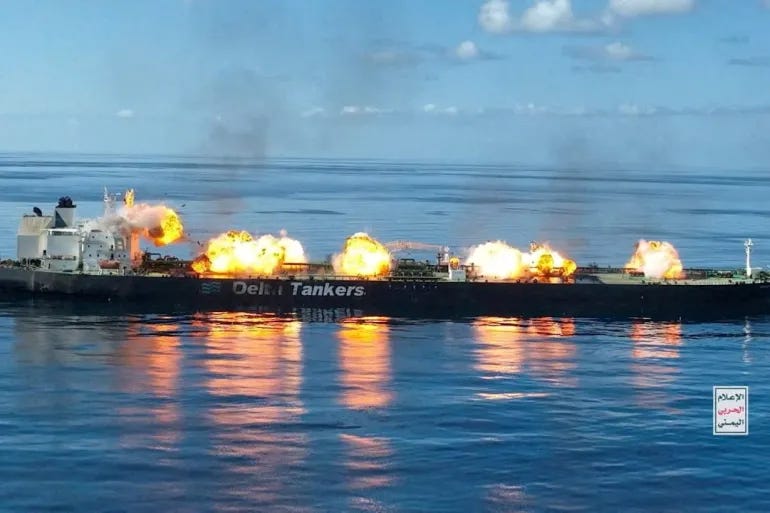Yemen's Houthis to Focus Attacks on Israel-Linked Ships Amid Gaza Ceasefire
Rebel Group Says It Will Cease Targeting U.S. and UK Vessels if Truce Holds
Yemen's Houthi movement has announced that it will restrict its attacks on commercial ships to those linked to Israel, provided that all phases of the Gaza ceasefire agreement are fully implemented. This development could ease disruptions that have impacted global maritime trade for over a year.
The Sanaa-based Humanitarian Operations Coordination Centre (HOCC), which facilitates communication between Houthi forces and commercial shipping operators, confirmed on Sunday that it would lift "sanctions" on vessels owned by U.S. and British entities, as well as those sailing under their flags.
However, the HOCC warned in an email to shipping industry officials that any aggression against Yemen by the United States, the United Kingdom, or Israel would result in the reinstatement of these measures.
A Houthi spokesperson told Al Jazeera on Sunday that the group would suspend military actions against Israel and commercial vessels in the Red Sea if the ceasefire took effect as planned. The truce, agreed upon by Israel and the Palestinian group Hamas, officially began on Sunday and is set to unfold in multiple phases over the coming weeks.
Impact on Global Trade
Since November 2023, the Iran-backed Houthis have launched over 100 attacks on ships in response to Israel’s military actions in Gaza. These assaults have resulted in the sinking of two vessels and the deaths of at least four seafarers.
The targeted areas include the southern Red Sea and the Gulf of Aden, which are linked by the strategically crucial Bab al-Mandeb Strait—a vital shipping passage between Europe and Asia. Many major global shipping companies halted their operations through the Red Sea last year, opting to reroute around Africa’s southern tip to avoid potential attacks.
In addition to targeting vessels, the Houthis have also launched direct assaults on Israel. In retaliation, the U.S. and the UK have conducted numerous airstrikes against Houthi-controlled sites in Yemen, while Israel has bombed critical infrastructure, including power plants and ports such as Hodeidah, a crucial hub for the war-ravaged nation.
Shipping Industry Remains Cautious
Despite the ceasefire, uncertainty lingers over the safety of Red Sea shipping routes. Retail and insurance executives told Reuters last week that they were still hesitant to resume operations in the region due to the risk of renewed attacks.
Although the number of vessels targeted remains relatively small compared to overall maritime traffic, the Houthi campaign has significantly raised costs for shipping firms. Increased risk-insurance premiums alone have added hundreds of thousands of dollars to the cost of a seven-day voyage through the affected area.
A spokesperson for German shipping company Hapag-Lloyd stated on Monday that the company was monitoring the situation closely and would return to Red Sea routes only when deemed safe. Meanwhile, Jakob Larsen, chief safety and security officer at shipping association BIMCO, suggested that if the ceasefire remains in place, companies are likely to gradually resume operations in the region.
The international shipping industry will be closely watching developments in Yemen and Gaza, weighing the stability of the ceasefire against the potential for renewed conflict and disruption to critical global trade routes.


